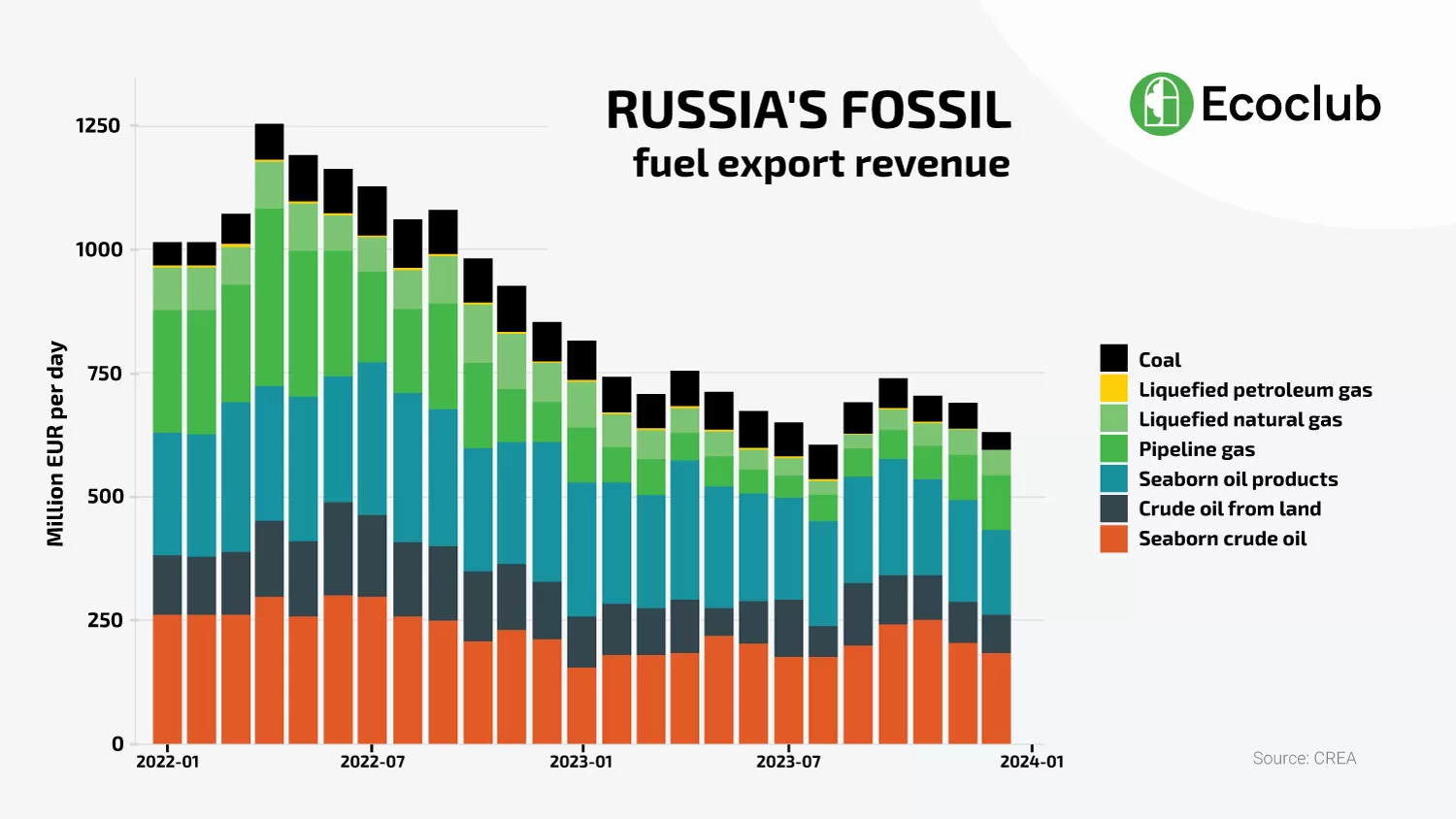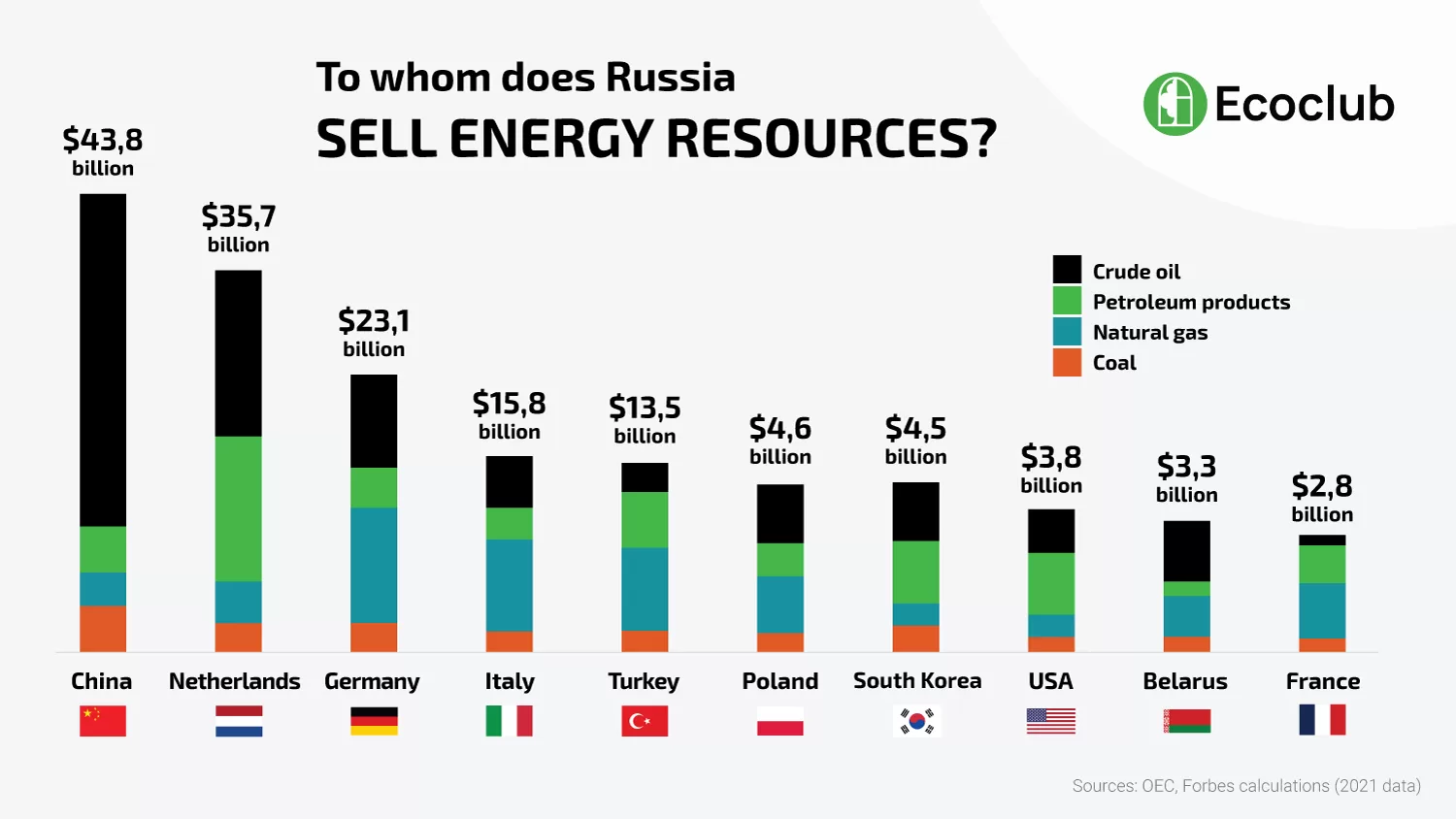Strengthening sanctions on the purchase of Russian energy resources is necessary to end the war in Ukraine. Russia is now circumventing restrictions, often illegally and dangerously, for people and the environment.
In addition the dependence of world countries on Russian fossil fuels slows down the development of renewable energy sources and exacerbates the climate crisis.
Why is it important to monitor compliance with sanctions, and how can we influence it?
What is the problem
Russia is one of the three largest oil producers in the world. As of 2021, oil and gas exports accounted for 45% of the country’s budget. During the open war, the countries of the world paid Russia more than 602 billion euros for the purchase of fossil fuels.

This allows the aggressor country to continue the war against the Ukrainian people, destroy cities, and damage the environment. Damage to Ukraine’s infrastructure during the war is more than 140 billion euros. More than 54 billion euros in environmental damage.
How Russia circumvents sanctions with shadow exports
Russian oil exports by sea increased in 2023. At the end of the year, the country was among the top five oil suppliers in the world.
In mid-2023, the European Union (EU) banned the import of Russian oil by sea. Despite this, Russia continues to supply oil and petroleum products in significant volumes, particularly to EU countries. They export mainly through the Baltic and Black Seas, through the territorial waters of Estonia, Finland, Denmark, Germany, France, Norway, Greece, Malta, and the United Kingdom.
Russian energy suppliers, mainly state-owned Rosneft, use shadow fleets for transportation. These are vessels registered in countries that have not joined the sanctions against the Kremlin. Such fleets mainly consist of obsolete and decommissioned tankers. The number of tankers in Russia’s shadow fleet is about 2000 vessels.

How shadow oil exports harm people and the environment
Vessels often turn off the identification system to remain invisible. This system helps to avoid collisions. During collisions and accidents, oil ends up in the sea. In addition, ship-to-ship transfers (STS) of oil are often observed at sea, accompanied by an oil spill. Obsolete vessels usually operate without proper insurance and regular technical inspection, so they have a higher risk of flooding. Last year, off the coast of the Philippines, an outdated oil tanker sank with five thousand barrels of oil on board, which spilled into the open sea. More than 200 000 people in the Philippines have been affected by oil spills, and thousands of fishermen have been threatened with their livelihoods as they have been unable to fish for months.
The Philippine Department of the Environment reported that more than 5,000 hectares of marine environments were affected, including over 2,000 hectares of coral, and seven marine protected areas were damaged.
A similar incident happened in May of the same year: a 27-year-old tanker (the service periodof an oil tanker is 20-25 years) with a capacity of 700 thousand barrels exploded and sank off the coast of Malaysia.
How to influence
To reduce Russia’s profits from the sale of fossil fuels, it is necessary to:
– Impose an embargo on all Russian oil and petroleum products.
– Monitor compliance with existing sanctions.
– Hold a public discussion on the impact of the Russian oil trade on the environment.
– Implement measures to protect marine ecosystems.
– Disseminate an open letter of appeal from Ecoclub to the leaders of Western countries.
“There should be a broad public discussion about the consequences of the Russian oil trade. Unfortunately, the seas and oceans of our planet have the most pollution problems. We cannot ignore this, and we should address the problems immediately. Russia must be held accountable not only for the large-scale destruction of Ukraine’s ecosystems but also for damage to aquatic ecosystems,” says Natalia Lytvyn, project coordinator of the NGO Ecoclub and the Energy Transition Coalition.
Photo: Aljazeera
This article was prepared within the framework of the project Monitoring and pushing for sanctions against Russian energy sources with the support of the Grassroots foundation.











